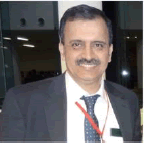Frustule as the supporting catalyst for the large-scale growth of Multiwalled carbon nanotubes and its application in Lithium ion battery
Ramaprabhu Sundara
Indian Institute of Technology, India
Abstract
Multiwalled carbon nanotubes (MWNT) have interesting electrochemical properties that can be used for the energy storage application. High quality MWNT are prepared by catalytic chemical vapor deposition method using carbon precursors. However, the practical application of MWNT is limited by the current techniques to provide large scale production. The selective choice of the catalyst can enhance the yield of MWNT. Herein, diatom supported metal-alloy based catalyst is used for the growth of MWNT. The cost of production of MWNT is further cut down by the use of liquefied petroleum gas as the precursor. The synthesised MWNT are uniform in diameter and the method of production does not require any process of purification. MWNT along with the catalyst frustule is used as the high capacity anode for the lithium-ion battery. The interaction of lithium ions with both MWNT and diatom increases the specific capacity to 1090 mAh g-1 at 0.05 A g-1 with cyclic durability of 2000 cycles. This work demonstrates a scalable method of production of MWNT from a cost-effective catalyst with the benefit of utilizing it as a high capacity anode material for lithium-ion battery.
Biography
Prof. Sundara Ramaprabhu is EG Ramachandran Institute Chair Professor at the Indian Institute of Technology Madras, India and working in nanotechnology, hydrogen energy technology, fuel cell technology, Battery. He has guided 38 Ph.D. students and 1 MS and 40 MSc/MTech projects. He is a member of the American Chemical Society and a member of the Electrochemical Society. He has authored 378 international journal publications and published 50 patents.

World Congress on Nanotechnology and Advanced Materials, July 09-10, 2020
Abstract Citation:
Ramaprabhu Sundara, Frustule as the supporting catalyst for the large-scale growth of Multiwalled carbon nanotubes and its application in Lithium ion battery, Nanotech expo 2020, World Congress on Nanotechnology and Advanced Materials, July 09-10, 2020
Open Access Journals
- Aquaculture & Veterinary Science
- Chemistry & Chemical Sciences
- Clinical Sciences
- Engineering
- General Science
- Genetics & Molecular Biology
- Health Care & Nursing
- Immunology & Microbiology
- Materials Science
- Mathematics & Physics
- Medical Sciences
- Neurology & Psychiatry
- Oncology & Cancer Science
- Pharmaceutical Sciences
